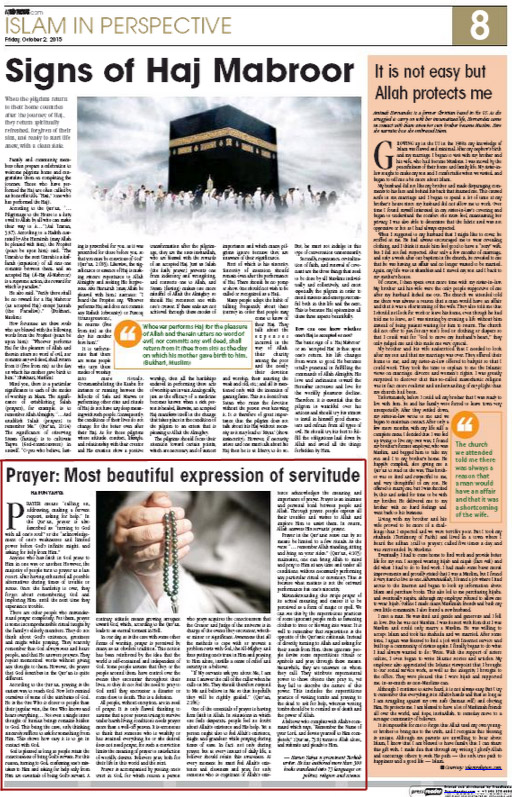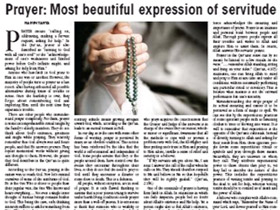
Prayer means "calling on, addressing, making a fervent request, asking for help." In the Qur'an, prayer is also described as "turning to God with all one's soul" or the "acknowledgement of one's weaknesses and limited power before God's infinite might, and asking for help from Him."
Anyone who has faith in God prays to Him in one way or another. However, the majority of people turn to prayer as a last resort, after having exhausted all possible alternatives during times of trouble or stress. Once the hardship is over, they forget about remembering God and imploring Him, until the next time they experience trouble.
There are other people who misunderstand prayer completely. For them, prayer is some incomprehensible ritual taught by the family's elderly members. They do not think about God's existence, greatness and might while praying. They scarcely remember that God always sees and hears people, and that He answers prayers. They repeat memorized words without giving any thought to them. However, the prayer that God describes in the Qur'an is quite different.
According to the Qur'an, praying is the easiest way to reach God. Now let's remind ourselves of some of the attributes of God. He is the One Who is closer to people than their jugular vein, the One Who knows and hears everything… Not even a single inner thought of human beings remains hidden to God. This being the case, only thinking sincerely suffices to ask for something from Him. This shows how easy it is to get in contact with God.
God is pleased as long as people retain the consciousness of being God's servant. For this reason, turning to God, confessing one's mistakes to Him and asking for help only from Him are essentials of being God's servant. A contrary attitude means growing arrogant towards God, which, according to the Qur'an, leads to an eternal torment in Hell.
In our day, as is the case with some other forms of worship, prayer is perceived by many as an obsolete tradition. This notion has been reinforced by the idea that the world is self-contained and independent of God. Some people assume that they, or the people around them, have control over the events they encounter throughout their lives, so they do not feel the need to pray to God until they encounter a disaster or come close to death. This is a delusion.
All people, without exception, are in need of prayer. It is only flawed thinking to assume that a poor person trying to survive under harsh living conditions needs prayer more than a well-off person. It is erroneous to think that someone who is wealthy or has attained everything he or she desired does not need prayer, for such a conviction limits the meaning of prayer to satisfaction of worldly desires. Believers pray both for their life in this world and the next.
Prayer is accompanied by putting one's trust in God, for which reason a person who prays acquires the consciousness that the Creator and Judge of the universe is in charge of the events they encounter, whether minor or significant. Awareness that all the methods to cope with or prevent a problem rests with God, the All-Mighty, and thus putting one's trust in Him and praying to Him alone, instills a sense of relief and security in a believer.
“If My servants ask you about Me, I am near. I answer the call of the caller when he calls on Me. They should therefore respond to Me and believe in Me so that hopefully they will be rightly guided.” (Qur’an, 2:186)
One of the essentials of prayer is having firm faith in Allah. In situations in which one feels desperate, people feel no doubt about Allah's existence and His help. Yet a person ought also to feel Allah's existence, might and grandeur while praying during times of ease. In fact, not only during prayer, but at every instant of daily life, a believer should retain this awareness. At every moment he must feel Allah's existence and closeness and pray, for only someone who is cognizant of Allah's existence acknowledges the meaning and importance of prayer. Prayer is an intimate and personal bond between people and Allah. Through prayer, people express all their troubles and wishes to Allah and implore Him to assist them. In return, Allah answers His servants' prayer.
Prayer in the Qur'anic sense can by no means be limited to a few rituals. As the verse "… remember Allah standing, sitting and lying on your sides." (Surat an-Nisa: 103) maintains, one can bring Allah to mind and pray to Him at any time and under all conditions, without necessarily performing any particular ritual or ceremony. That is because what matters is not the outward performance but one's sincerity.
Misunderstanding this strips prayer of its actual meaning and causes it to be perceived as a form of magic or spell. We can see this by the superstitious practices of some ignorant people such as fastening clothes to trees or blowing into water. It is well to remember that superstition is the opposite of the Qur'anic rationale. Instead of directly turning to Allah and asking for their needs from Him, these ignorant people devise some superstitious rituals or symbols and pray through these means. Meanwhile, they are unaware on whom they call. They attribute supernatural power to those objects they pray to, yet they fail to describe the nature of this power. This includes the superstitious practice of visiting tombs and praying to the dead to ask for help, whereas visiting tombs should be to remind us of death and the power of Allah.
A believer who complies with Allah's command which says, "Remember the Name of your Lord, and devote yourself to Him completely." (Surat al-Muzzammil: 8) turns to Allah alone, and submits and pleads to Him.
Adnan Oktar's piece on Arab News


